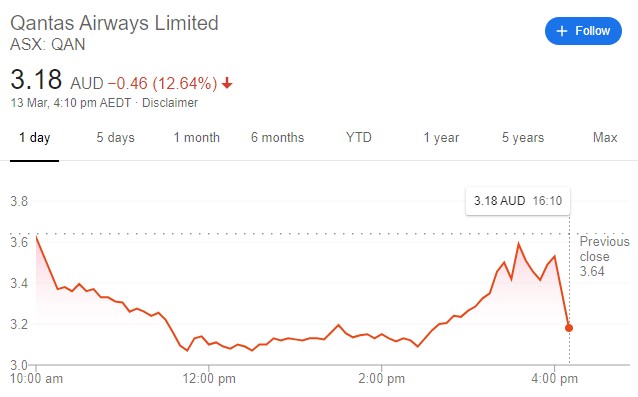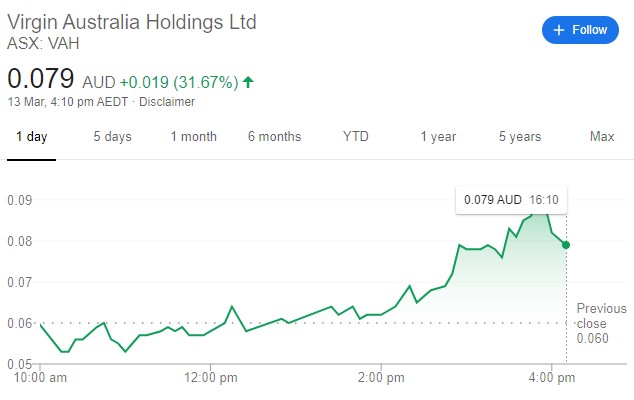Prime Minister Scott Morrison’s advice to Australians to reconsider all overseas travel dramatically reversed an earlier fightback from Qantas shares on Friday.
Shares, which closed at $3.64 yesterday, dipped to $3.07 at 11:45am, before bouncing back to $3.59 later in the day. However, minutes after the announcement, they nosedived to $3.18.
At around 3:25pm AEDT, the Prime Minister advised citizens to only make “essential” international travel. He also banned gatherings of more than 500 people from Monday, excluding schools, universities, offices and transport.

The drama also came a day after US President Donald Trump declared an unprecedented ban of flights from mainland Europe to the US, which had knock-on effects for the aviation industry.
Virgin shares, however, mounted a recovery on Friday afternoon, despite the company announcing it was set to cut capacity and freeze hiring earlier in the day.
On Friday afternoon, stocks surged to $0.089, significantly higher than yesterday’s low of $0.053. They finished up 31 per cent on $0.079.

Earlier on Friday, Virgin announced it would increase capacity cuts to 7.7 per cent for the first half of the financial year, stop bonuses, trim marketing spend and reduce chairman and board director fees by 15 per cent.
Chief executive Paul Scurrah said the airline was less exposed to the impact of COVID-19 because domestic operations account for 88 per cent of passengers and 78 per cent of flight revenue.
Scurrah said, “The reductions in services will also mean reduced flying for our crew and we are committed to working with them through this period and providing a range of options.”
The market appeared to receive the measures well, with Virgin Australia shares rising steadily throughout the day.
Internationally, shares in Delta and United, the airlines most affected by President Trump’s EU travel ban, slumped by more than 20 per cent on Thursday.
Huge falls were also seen by major international carriers such as American (17 per cent), Lufthansa (14 per cent), British Airways (16 per cent), Air France (13 per cent) and Ryanair (5 per cent).
The International Air Transport Association (IATA) has estimated that 200,000 flights carried passengers into the affected areas last year, averaging at about 550 flights carrying 125,000 travellers per day.
Over the next four weeks, the duration of the ban, 6,700 flights in each direction would be affected, according to an analysis by aviation data provider OAG.
Delta is the most affected, operating 17 per cent of those flights; United next, with 14 per cent; and Lufthansa third, with 13 per cent.
Yesterday, Delta shares closed at $33.71 (down 21 per cent) and United at $37.08 (down 25 per cent).
The current EU to US travel ban, which comes into effect on midnight, Friday, only applies to countries in the so-called Schengen Area that have abolished passport and border controls. Those countries are: Austria, Belgium, Czech Republic, Denmark, Estonia, Finland, France, Germany, Greece, Hungary, Iceland, Italy, Latvia, Liechtenstein, Lithuania, Luxembourg, Malta, the Netherlands, Norway, Poland, Portugal, Slovakia, Slovenia, Spain, Sweden, and Switzerland.















